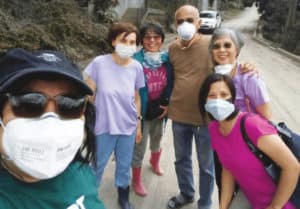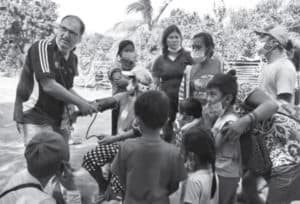As the current version of the coronavirus (COVID-19) spreads throughout the globe, it is hard not to worry. I have never been overly focused on my health, but all of a sudden every tickle in my throat provokes a little wave of anxiety: Do I have it? Was I too close to that coughing lady on the subway? Did I wash my hands after touching that banister? And what about my aging parents who live quite a distance from me, in a state where there are more cases — Are they being careful enough? And what if the economy continues to tailspin? I struggled to get a hold of myself.

One morning, I brought to prayer my own sense of powerlessness, in front of the myriad uncertainties that COVID-19 was bringing in our daily lives. It was then that I remembered a wonderful account I had recently heard about the Focolare community in Tagaytay, near Manila, in the Philippines. They were living amid their own anxieties in the wake of the devastating damage following the eruption of the nearby Taal volcano last January 2020.
Their little town was covered with ash, and their own cleanup process was intense. But their hearts were wide enough to embrace the difficulties of friends in Laurel, a town just over four miles from the crater, who had to wait longer to re-enter their homes.

They created a chat group they called “Team TAAL” — transforming the name of the volcano that had done so much damage into the acronym, “Tagaytay ascolta (listens to) Laurel.” As one
of the members of the team shared: “This name helped us to remember that above all we hoped to listen to people, in order to share their pain and to discover together how we can help concretely, especially those who were suffering the most.”
For many of the people they encountered in Laurel, the Tagaytay listening team was the first to visit them in their homes, some of which had been destroyed. The team did not bring a lot of material, just a pot of rice porridge to share, face masks and some small toys for the kids. But they were there to listen with open hearts, receiving, often amidst tears, the stories of what people had suffered. “We rise from the ashes,” they wrote, “together with our neighbors.”

As I prayed, the inspiring example of this “listening team” whispered to my own heart: “There is something you can do, too. You may not be shoveling ash in the Philippines, but you too can focus on your neighbor. You too can be a part of a listening team.”
And with this, I felt a certain calm begin to replace my waves of anxiety. As I moved through my day of work in a university setting, the calm helped me to tune into more sensitive antennae, to pay attention to anyone who needed to talk through their own worries. Chatting with a colleague in the hall, it helped me to convey that I had ample time to receive her concerns about whether her elderly father being quarantined in another country was safer here, or there, together with her own disappointment with the cancellation of a long-planned study trip.
I found new energy to take in the frustrations of another colleague struggling with endless meetings to work through the tangle of administrative decisions regarding the cancellation of numerous international programs. During an office-hours conversation, I uncovered a new depth of empathy for a student who shared how the massive disruptions due to travel restrictions were making it impossible for them to concentrate.

Later in the week, with the group of students in my seminar, I found within me a new capacity to convey not only a sense of calm but also to show that my top priority was having an open door for each of them — or an open video chat, if all of our contact should become virtual.
In another moment of prayer, going over the week I realized that in the grand scheme of global challenges, many of our concerns were relatively small. And in the grand scheme of things, my own concrete contributions were also relatively small — like the shared pot of rice, like toys for the kids in Laurel. But the interior shift was meaningful. Perhaps that emerged especially from the sense of being connected to “listening teams” responding to many kinds of crises throughout the globe.




